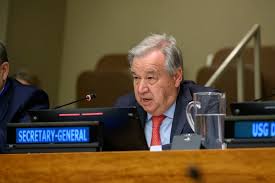Context:
Recently, United Nations Secretary-General underscored the crucial need for ensuring cyber safety.
Key Highlights
- At a high-level debate hosted by the United Nations Security Council in New York, Secretary-General Antonio Guterres emphasized that while digital empowerment brings numerous benefits, it also entails significant risks for individuals and organizations.
- UN Security Council Debate, titled “Maintenance of International Peace and Security: Addressing Evolving Threats in Cybun secretary general article 99erspace,” brought together UNSC members to discuss the complexities of cyberspace safety.
- A key concern raised was the increasing weaponization of digital tools, with Guterres highlighting the year-on-year rise in associated risks.
New Security Challenges in the Digital Age
- Weaponization in Conflicts: The use of cyberattacks as weapons in ongoing armed conflicts is blurring the lines between combatants and civilians, further complicating modern warfare.
- Integration with Weapon Systems: The integration of digital tools with autonomous weapon systems raises new vulnerabilities and ethical questions.
- Malicious Activities: Destructive online activities can undermine public trust, disrupt elections, and potentially incite violence.
Call for International Cooperation
- The Secretary-General emphasized the importance of prevention in cyberspace, echoing the principles outlined in the “New Agenda for Peace.”
- He urged all nations to collaborate on establishing robust frameworks for international cooperation. These frameworks should be built on existing international law, human rights principles, and the UN Charter.
- Antonio Guterres concluded by emphasizing that the rule of law must be upheld in the digital realm just as it is in the physical world, as outlined in the ‘New Vision for the Rule of Law”.
- This collaborative approach is crucial in mitigating cyber threats and ensuring a safe and secure digital future for all.
About the United Nations Security Council
- It is one of the six principal organs of the UN.
- The role involves maintaining international peace and security, recommending the admission of new UN members, approving changes to the UN Charter, establishing peacekeeping operations, enacting international sanctions, and authorizing military action.
- The council comprises 15 members of which 5 permanent members include China, France, Russia, the United Kingdom, and the United States, each holding veto power, and 10 non-permanent members elected by the General Assembly for two-year terms, with 5 being replaced each year.
Abot the UN Secretariat
- The United Nations Secretariat is one of the six principal organs of the United Nations (UN).
- It is the UN’s executive arm, responsible for carrying out the day-to-day work of the organization as mandated by the General Assembly, Security Council, Economic and Social Council, and other UN bodies.
- The Secretariat is headed by the Secretary-General, who is appointed by the General Assembly on the recommendation of the Security Council.

